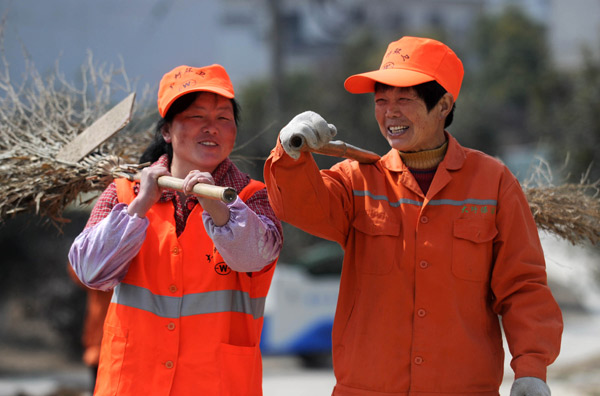Move to improve tax rule means business
Easing workers' burden
Individual income tax has come a long way in China. It was enacted in 1980, when China's economic reform was still in its infancy and the average urban income was about 64 yuan a month. The threshold was initially set at 800 yuan a month, based on the living cost for foreigners, said Shi Yaobin, director of the Finance Ministry's tax policy department in 2005.
|
Medium- and low-wage earners are the principal beneficiaries targeted by proposed revisions to individual income tax. These workers were busy in sanitation jobs in Hefei, Anhui province. |
By 1992, only 1 percent of China's working population earned more than 800 yuan a month. A decade later, that number jumped to 52 percent, said then-Finance Minster Jin Renqing. The threshold was raised to 1,600 yuan in 2005 and to 2,000 in 2008.
Central authorities say the latest draft plan to the individual income tax law aims to help low-wage workers combat rising living costs. It will also serve as a means to boost domestic consumption, thereby helping transform China's export-oriented growth mode, said Zheng Xinli, a member of the National Committee of the CPPCC.
Raising the individual income tax entry point to 3,000 yuan a month will exempt more than 20 percent of China's labor force from income taxes, China International Capital Corp, the country's top investment bank, said in a recent report.
While welcoming the draft plan, experts, lawyers and some wage earners suspect its proposed effect on narrowing the wealth gap will be limited.
Salaries, the main source of individual income tax, are a trivial portion of income for the more affluent people, said Zhang Wenchun, a taxation professor with the School of Finances at Renmin University.
Zhou Dewen, president of the Small and Medium Enterprises Development Association in Wenzhou, Zhejiang province, one of China's wealthiest cities, acknowledged that business owners typically do not have high salaries.
"Their profits are mostly from stock shares or appreciation of their business assets," he said. Zhou himself is paid just 3,000 yuan a month by the association, but also serves as board members at "a few companies". He said he pays no tax on dividends from shares.
"I support higher taxes for the rich. But it's the government's job to think about how to tax high-income people," Zhou said.
 0
0 







